#and the fleeting nature of his own life. hence transience
Text
Mahito and Todo
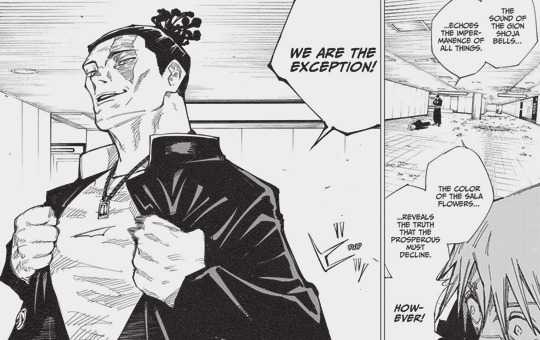
Gionshōja no kane no koe, Shogyōmujō no hibiki ari. Sarasōju no hana no iro, Jōshahissui no kotowari wo arawasu. Ogoreru mono mo hisashikarazu, tada haru no yo no yume no gotoshi. Takeki mono mo tsui ni wa horobin(u), hitoeni kaze no mae no chiri ni onaji.
The sound of the Gion Shōja bells echoes the impermanence of all things; the color of the sāla flowers reveals the truth that the prosperous must decline. The proud do not endure, they are like a dream on a spring night; the mighty fall at last, they are as dust before the wind.
Todo is quoting the Tale of the Heike, one of the most famous stories in japanese literature. The central theme of the story is the Buddhist law of impermanence, specifically in the form of the fleeting nature of fortune. It’s remarking on the transitory nature of life. In other words, nothing is permanent.
However, Todo only quotes the first part of the text. However, we are the exception! Is something Todo added. Not only is he altering a classical text which has implications of arrogance in a cultural context, Todo is also turning the quote around entirely to say that even if everything in the world is fading, his friendship with Yuji will never fade.
All of this to say, that Todo and Mahito’s philosophies towards life are complete opposites. Mahito represents the inevitability of decay, which is why his touch destroys whereas Todo insists he is stronger than that decay, then that inevitability, and arrogant enough to fight against it. More on their character foiling under the cut.
1. Life Circles
The 4-character expression (yojijukugo) "the prosperous must decline" (盛者必衰, jōshahissui) is a phrase from the Humane King Sutra, in full "The prosperous inevitably decline, the full inevitably empty" (盛者必衰、実者必虚, jōsha hissui, jissha hikkyo).
Mahito as a character is someone very observant of natural law, and the nature of the world around him. His closest friends are all literally made to be embodiments of nature as cursed spirits.
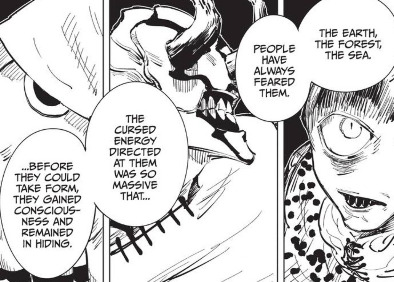
The budhist law of impernanence is another natural law, remarking that with time everything fades. Eventually everything in this world will die. LIfe is fleeting, etc. etc. Mahito as a character has a special understanding of both the composition of the soul and the body. He can see through it in a way that others can’t.
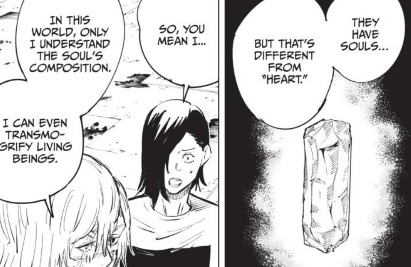
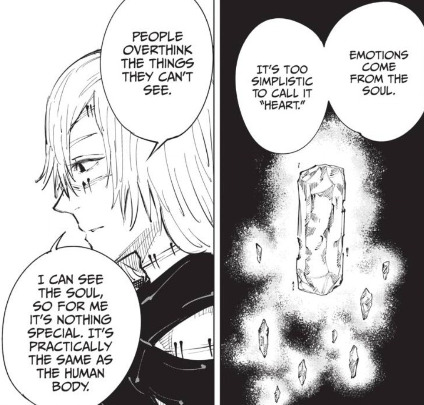
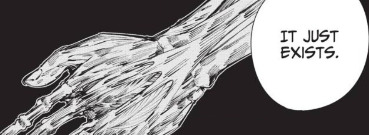
However, his ability to see the soul causes him to dismiss it as nothing special. It is just another part of life. Mahito as a character observes and compeltely obeys both natural law and his nature. He is a curse. He’s there to curse people. He does that to his fullest ability. To Mahito life circles around. It cycles. Everything living must inevitably die, and because of that there’s really no point in attaching meaning to something imperanent.
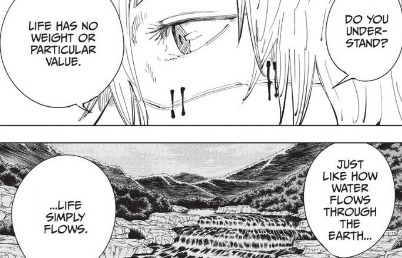
Mahito just sees it as something that goes in circles. He doesn’t see the soul as anything special. Humans and curses both have souls, so they’re completely equal in his eyes. Human awareness, reason, logic, emotions, values, connections, doesn’t add anything to it, because Mahito can’t see them therefore it’s all made up. Mahito’s argument towards life then becomes very nihilistic.
Everything is the same in his eyes. Mahito can twist a human form to a fat, bulbous monster, but he still sees it as a human because there’s a human soul dwelling inside of it. Mahito rejects the idea that any of these things, human reason, human emotions, give any sort of value to life.
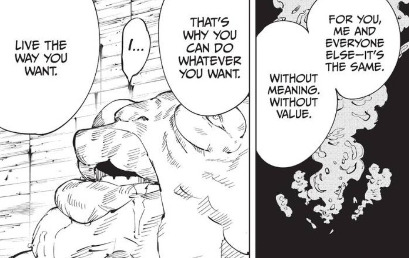
Mahito is inherently nihilistic, at least in the sense of moral nihilism. There is no meaning to life, therefore it gives me liscense to do whatever I want. He doesn’t have any respect for life in the slightest. Everything is fleeted to Mahito, so he’s completely without respect, and without sentiment, because to Mahito there is no point in getting invested in something that is inevitably going to die anyway.
Mahito is the embodiment of the fear of other human beings. Therefore it only makes sense, that he denies connection. Humans have no connection to one another, and no conenction to the world around them, they’re just there. It’s inherently nihilistic statement, because he’s arguing basically there’s no meaning to existence.
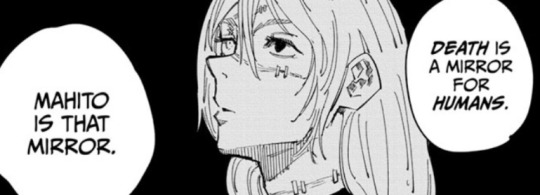
Jogo even calls Mahito the embodiment of death because he reflects that idea so well, that everything dies. Even Mahito’s own curse ability is the embodiment of his inability to connect, if he reaches out and touches someone he only harms them with just a single touch of his hand. Hands are pretty basic symbols of human connections.
However, even though Mahito’s nihilistic he’s not indifferent. He outright hates, and torments other humans. He encourages Junpei to hate life, exactly like he does.
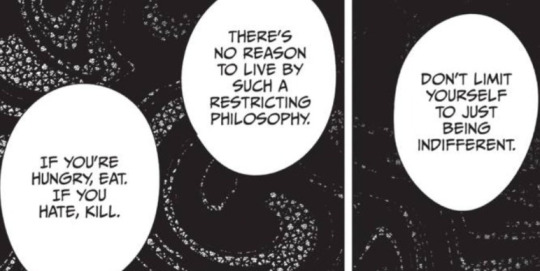
2. We Exist
If Mahito is a character that hates life, antagonizes life, then Todo is the complete opposite of that. Todo is someone who represents love and connection. Hence why even down to his curse energy takes the form of little hearts.
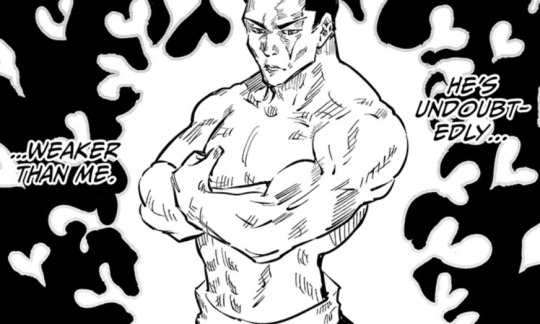
Every detail we know about Aoi, centers around this idea of love, and particularly this love of life. The hearts are a repeating motif with him, they even appear on his volume cover. We know he has a crush on an idol named Takada.
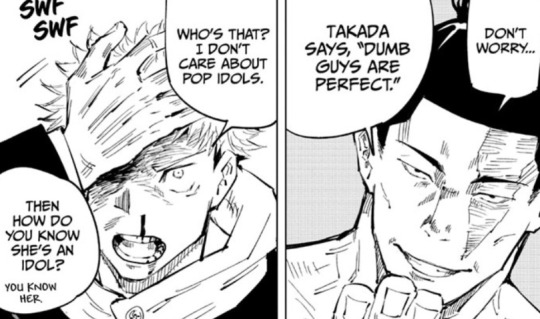
The first question he always asks people when he meets them is what kind of girl do they like, (but even if it’s a guy who is only into other guys he finds that answer acceptable as well).
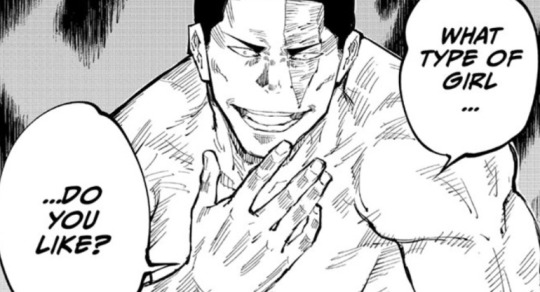
He dismisses Megumi from the moment he meets him, but immediately falls head over heels for Yuji. However, look at the difference between Yuji and Megumi. Megumi is someone who feigns indifference, and pretends not to be invested in the life around him. He’s always repressing his emotions and pretending he’s not interested. Yuji on the other hand, loves life, loves other people, and will react to save people’s lives without even thinking. Megumi is principled, but Yuji is unprincipled and acts on a simple love for the people around him, so therefore it makes sense why he’s more Todo’s type.
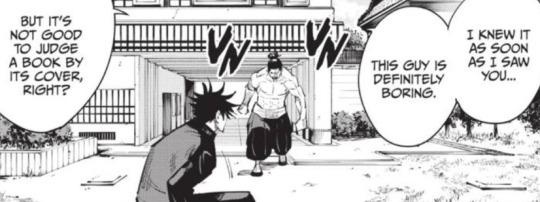
The only other person Todo seems to respect on the level of Yuji is Okkotsu Yuta, who also said this. Whose cursed technique was converting the girl he loved into a cursed spirit to remain with him after her death.

If Mahito’s character is built around the hatred humans have for each other, Todo is built around love. Even if it’s kind of in a weird way sometimes. He asks people what kind of girls they love. He respects people who are open about what they love. This isn’t even the first time that Love and curses have been connected thematically to each other in the series.

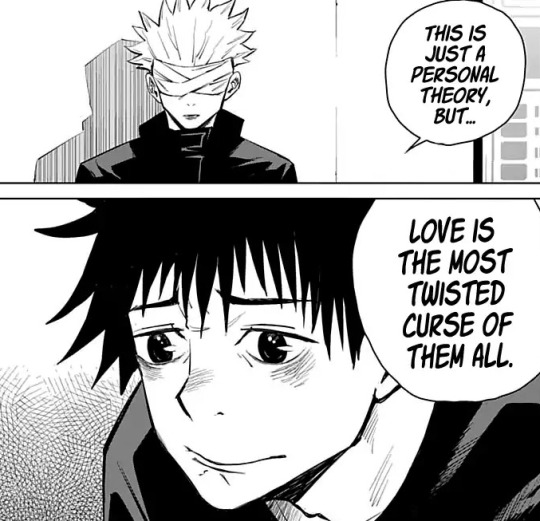
Love and curses are presented as a complementary pair. That is rather than being binary opposites ,like life and death, fire and whater, they’re like yin and yang. Two ideas that seem like opposites but go together. Love can be like a curse. You can curse someone you love. Etc. etc.
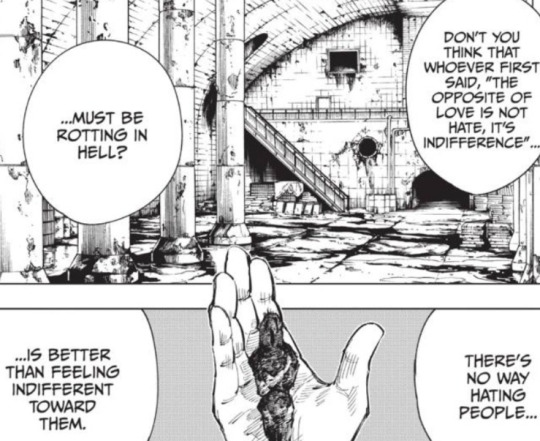
Love and hate, is much like love and cursing, seem like they’re opposite ideas. They’re traditionally held to be opposites. Mahito even comments on this. There’s Junpei who is apathetic. Mahito says the true opposite of love is hate, and saying apathy is the opposite is just japanese wordplay. He then encourages Junpei to hate people, to curse them. Mahito is a cursed spirit, hating people, cursing people is in his nature.
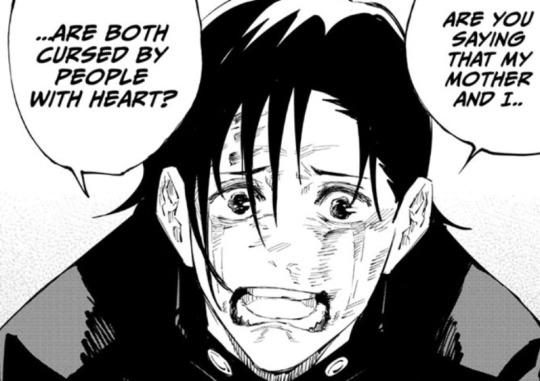
Junpei even said, the hatred that the bullies constantly lobbed against him, the fact that his mother was killed, it all felt like he was being cursed by everyone around him. Cursing people, hating people, are presented as the same thing to Mahito.
Mahito’s philosophy is basically that there’s no particular meaning to existence, therefore it’s okay to hate life.
Both Mahito and Todo have a special insight to how cursed energy flows around him. Todo as weird as he is, seems like the wisest of all the students especially in regards to curse energy.
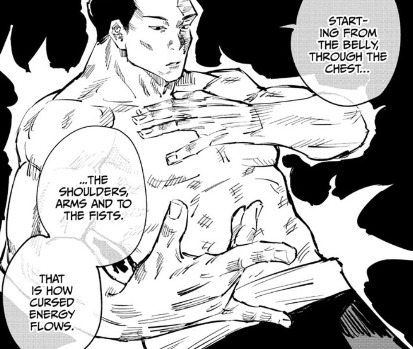
Todo has a similiar perspective of the world as Todo. He too says that life, that cursed energy flows through the world. However, rather than using that argument for nihilism, he uses it for existentialism. Mahito says we don’t exist that there’s nothing special for existence. Todo says we do exist. Therefore it’s okay to love life.
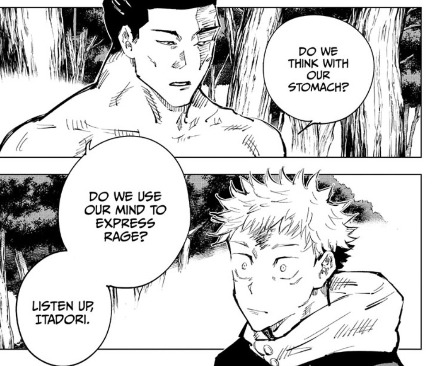
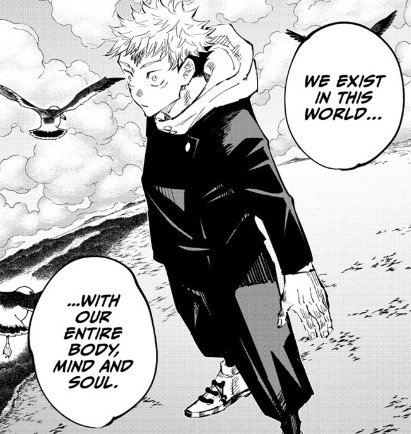
While Mahito encourages Junpei to hate and spite others, Todo does the opposite of that, telling Todo to repress his hatred for now, because he has to think of the feelings and well being of the people he loves and is trying to protect first.
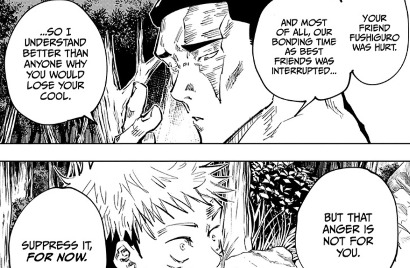
Todo is someone who fights against the natural order of things, for the sake of the love he feels for other people. He even literally fights Hanami, who is an embodiment of nature.
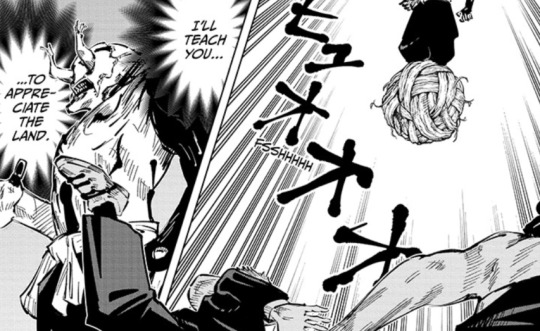
Hanami, the practice of watching the blooming sakura flowers is also a symbol of transience. Todo fights against this transience, and declares himself the exception. Mahito is natural order, Todo opposes natural order. Therefore in both love and hate, and also in philosophy they are complete opposites. Todo fights for what he loves, and Mahito fights for the sake of hating others.
Even in thie cursed techniques they are opposites. They both use their hands. However, Boogie Woogie is a cursed technique ideally suited for cooperation. When he claps his hands together he switches places with anything. Todo is like, the one sorcerer in the series whose cursed technique is far better for team fights than it is solo fights.
Mahito calls for them to curse each other.
Todo, blows a little kiss when he’s fighting against Mahito, another symbol of love.
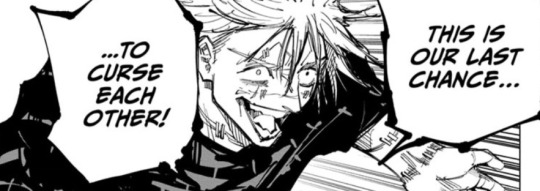
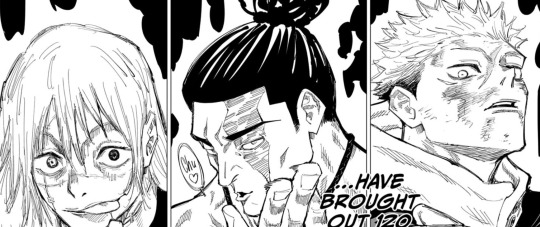
(Mahito’s Let’s curse each other, is also a callback to Geto’s let’s curse each other. Geto is someone who after all, hates humans as well, at least the ones who aren’t jujutsu sorcerers).
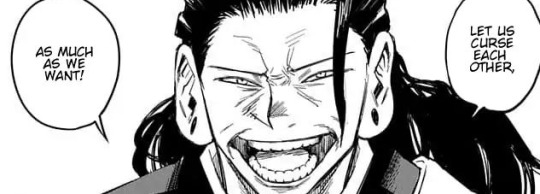
When Mahito shows Yuji he is all alone by killing two of his allies Nobara and Nanami (Nobara is fine though), Todo shows Yuji that they are still all together because he is carrying the feelings of his allies with him. Something Mahito would insist means nothing. Something Todo says means everything.
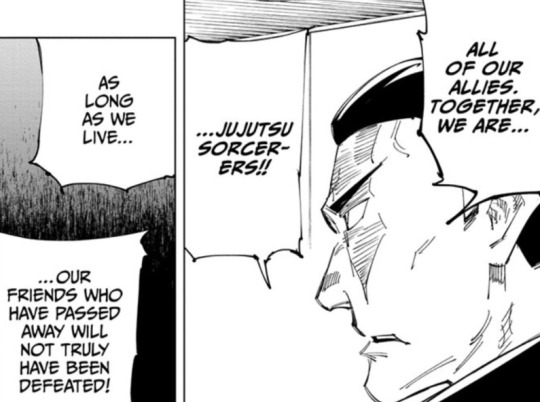
Lastly, when Mahito moves to finish off Todo he’s distracted for a moment by Todo’s little locket. The symbol of his love for both Yuji and Takada.
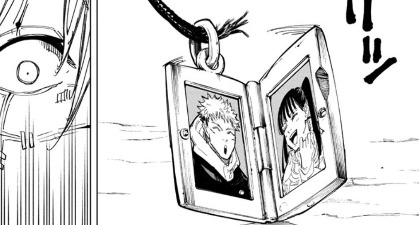
Which buys Todo enough time to clap Mahito’s hand and used his cursed technique even after one of his own hands is completely blown off. Hands are the symbol of connection, Todo connects to others and Mahito doesn’t.
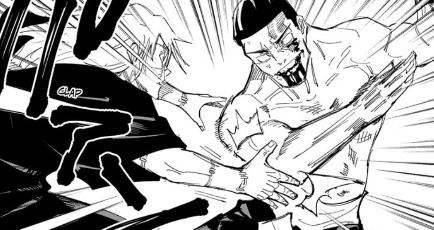
What’s ultimately ironic is the memories Todo has are completely fake. They are made up. Just like Mahito says, there is no meaning to life, any kind of meaning we try to make is just made up. However, even though Todo’s friendship with Yuji is completely imaginary, he obviously values it. His fake friendship with Yuji trumps Mahito who really only values his own individuality, and only thinks about himself.
Mahito says I am the only thing that’s real, therefore it’s only natural I only care about myself.
Todo says, my friendship is Yuji is real, and our feelings will far outlast both of us.
#todo aoi#aoi todo#mahito#yuji itadori#itadori yuji#jujutsu kaisen meta#jujutsu kaisen#jujutsu kaisen theory#jjk meta#cursed spirit#cursed technique
470 notes
·
View notes